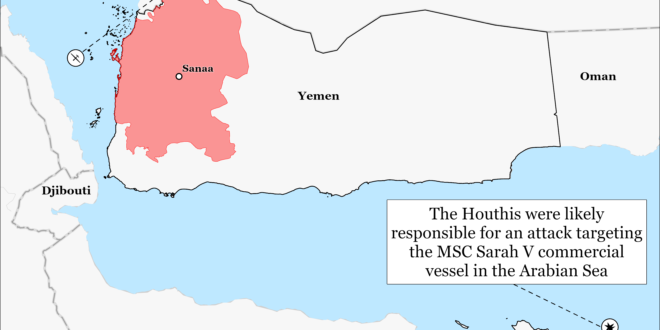Hamas is rebuilding its weapons production capacity in the Gaza Strip as part of a larger effort to reconstitute its military forces. An Israeli military correspondent reported on June 24 that Hamas is establishing small weapons manufacturing sites across the Gaza Strip in order to replenish its stockpiles of military equipment and weapons.[i] The replenishment of these resources is a key component to the reconstitution of a military force.
Reconstitution consists of two general tasks: reorganization and regeneration. Reorganization involves a commander redistributing the resources at their disposal to restore attritted units to a minimal level of effectiveness.[ii] Regeneration is a more complex, resource intensive, and time intensive process “that requires large-scale replacement of personnel, equipment, and supplies.“[iii] This process naturally involves replenishing stockpiles of military equipment and weapons. Hamas is also recruiting 18-year-olds and trying to train them as part of that reconstitution effort, as CTP-ISW previously reported, which is crucial to restoring combat units.[iv] These reports indicate that at least some Hamas commanders have begun to regenerate the forces and materiel under their command and could become again prepared to engage Israeli forces.
The Israel Defense Forces (IDF) is trying to disrupt Hamas’ reconstitution efforts by targeting relevant Hamas officials. The IDF conducted an airstrike killing a Hamas weapons production specialist in Gaza City on June 23.[v] The IDF stated that the specialist developed ”strategic“ weapons for Hamas and oversaw several weapons development cells.[vi] The IDF has killed about 45 weapons production specialists from Hamas and Palestinian Islamic Jihad (PIJ) since the war began.[vii]
Hamas will likely try to exploit the absence of Israeli forces throughout much of the Gaza Strip in order to facilitate its reorganization and regeneration efforts.[viii] A commander usually must disengage their force from opposing forces to efficiently and successfully reconstitute. Hamas has exploited IDF withdrawals in much of the Gaza Strip to rebuild the combat power of degraded Hamas battalions, integrate new forces, and prepare them for further combat activities. This is particularly accurate in the al Mawasi humanitarian zone, where Hamas has reportedly established weapons production workshops.[ix]
Iranian presidential candidates discussed socio-cultural issues during the third debate for the upcoming election. None of the presumed frontrunners (Mohammad Bagher Ghalibaf, Saeed Jalili, and Masoud Pezeshkian) suggested that they would support fundamental changes to long-standing regime policies. All three frontrunners indicated support for the mandatory hijab law and did not suggest that they would support easing restrictions on women’s dress code.[x] That none of these candidates challenged the regime policy reflects their subordination to Supreme Leader Ali Khamenei, who has expressed opposition repeatedly to changing the hijab requirement. Khamenei has described veiling as an “irrevocable, religious necessity.”[xi] The frontrunners did debate slightly how to enforce the mandatory hijab law.
Mohammad Bagher Ghalibaf (pragmatic hardliner). Ghalibaf emphasized that all regime bodies—not just the national police force—should encourage and enforce the hijab requirement.[xii] Ghalibaf claimed that some regime bodies have supported the police insufficiently in enforcing the mandatory hijab law, leading to violent confrontations between the regime and unveiled women. Ghalibaf also expressed support for a recent hijab enforcement bill that Parliament is considering currently. The legislation codifies legal punishments, including fines and salary cuts, for women who violate the hijab requirement.[xiii]
Masoud Pezeshkian (reformist). Pezeshkian emphasized his opposition to using violence to enforce the mandatory hijab law but did not propose changing the law itself.[xiv] Pezeshkian described regime treatment of unveiled women as immoral. Pezeshkian also argued that the regime could stop women from questioning the need to veil by changing how it educates girls in mosques and schools. This statement mirrors similar remarks from Khamenei calling for greater emphasis on indoctrinating Iranian youth in order to resolve social issues.[xv]
Saeed Jalili (ultraconservative hardliner). Jalili avoided addressing the hijab issue directly and instead focused on criticizing the West. Jalili accused the West of hypocrisy for condemning Iran for treating women harshly while ignoring the deaths of Palestinian women in the Gaza Strip.[xvi]
The frontrunners’ comments on the mandatory hijab law reflect their efforts to appeal to certain demographics. Pezeshkian has consistently tried to rally Iranian youth who are frustrated with the harsh enforcement of the hijab requirement. Jalili contrastingly tried to pander to hardline, anti-Western voters in order to distinguish himself from Ghalibaf.
The frontrunning candidates separately expressed support for ongoing censorship and internet restrictions in Iran. Ghalibaf and Pezeshkian both claimed that they support internet freedom but added that censorship is necessary during “crises.”[xvii] Ghalibaf emphasized the need to “carefully and intelligently monitor” the internet and expressed support for building the national intranet, which would increase regime control of the Iranian domestic information space.[xviii] Jalili praised regime efforts to develop indigenous communications and social media platforms as alternatives to Western platforms.[xix]
Key Takeaways:
- Gaza Strip: Hamas is rebuilding its weapons production capacity in the Gaza Strip as part of a larger effort to reconstitute its military forces. Hamas has also begun trying to recruit and train 18-year-olds to this end.
- Iran: Iranian presidential candidates discussed socio-cultural issues during the third debate of the upcoming election. None of the presumed frontrunners suggested that they would support fundamental changes to long-standing regime policies.
- West Bank: PIJ detonated an IED around Bat Hefer, which is near the Israel-West Bank border. The attack comes amid an uptick in Palestinian militant activity in the area in recent weeks.
- Lebanon: Workers at Beirut-Rafik Hariri International Airport are reportedly concerned about an increase in Iranian weapons deliveries to Lebanese Hezbollah.
- Iraq: Hamas is reportedly planning to relocate its political leadership from Qatar to Iraq. Iran and the Iraqi federal government would reportedly provide security to Hamas leaders in Iraq.
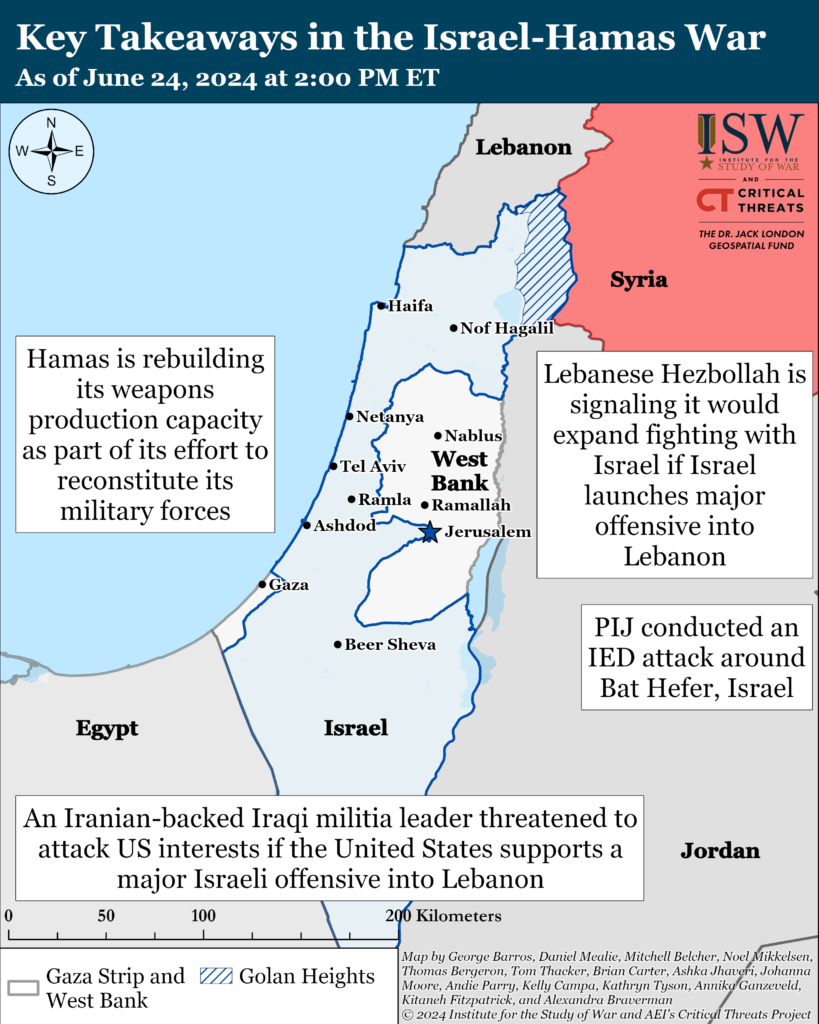
Gaza Strip
Axis of Resistance objectives:
Erode the will of the Israeli political establishment and public to sustain clearing operations in the Gaza Strip
Reestablish Hamas as the governing authority in the Gaza Strip
The Israel Defense Forces (IDF) 99th Division continued operations south of Gaza City along the Netzarim corridor on June 24.[xx] Israeli forces conducted a drone strike targeting Palestinian fighters near the corridor.[xxi] Palestinian militias conducted two indirect fire attacks targeting Israeli forces along the corridor.[xxii]
The IDF 162nd Division continued clearing operations in Rafah on June 24.[xxiii] Israeli forces located weapons and destroyed rocket launchers used to target Israeli forces in Tal al Sultan.[xxiv] The IDF killed several Palestinian fighters who posed a threat to Israeli forces and destroyed several tunnel shafts in Rafah.[xxv] PIJ mortared Israeli forces in central and western Rafah.[xxvi]
IDF Chief of Staff Lieutenant General Herzi Halevi said during a visit to Rafah on June 23 that the IDF has nearly dismantled Hamas’ Rafah Brigade “as a fighting unit.”[xxvii] Halevi noted that he does not define the dismantlement of Hamas as killing every Hamas fighter even though Hamas has sustained significant casualties. Halevi’s statement mirrors IDF spokesperson Daniel Hagari‘s June 19 assertion that “the idea that we can destroy Hamas or make Hamas disappear is misleading to the public,” because “Hamas is an idea, Hamas is a party. [Hamas is] rooted in the hearts of the people—anyone who thinks we can eliminate Hamas is wrong.”[xxviii] The IDF has concentrated most heavily on killing Hamas leadership and destroying underground infrastructure, particularly in Rafah. Hamas elements are trying to reconstitute in areas that the IDF is not actively clearing in the Gaza Strip.
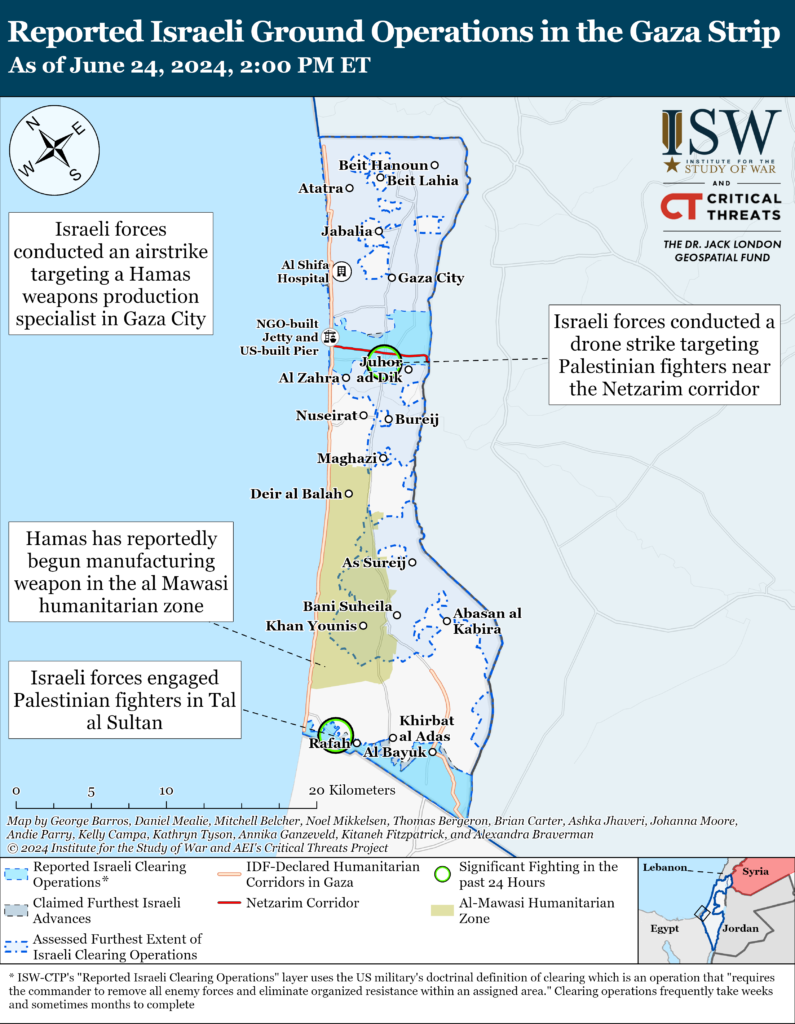
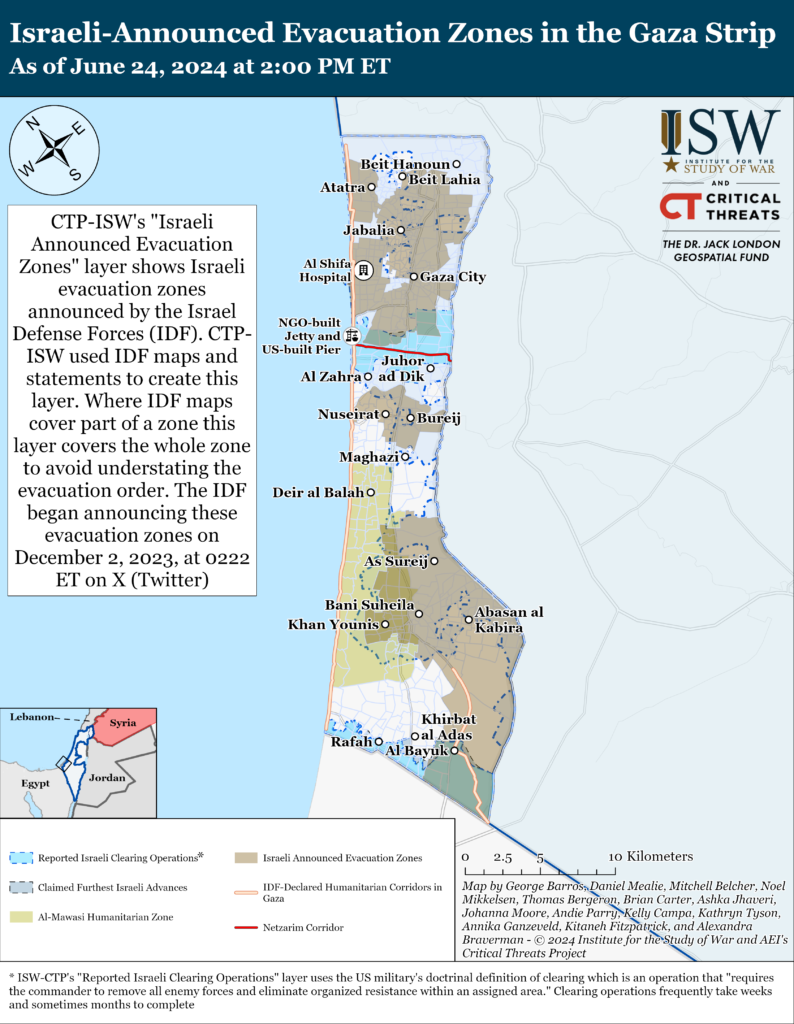
Israeli Prime Minister Benjamin Netanyahu said in an interview on June 23 that he would be open to a “partial deal” with Hamas that only frees a portion of the Israeli hostages whom Hamas holds.[xxix] Netanyahu walked back this statement in a Knesset meeting on June 24 by saying that he is “committed” to the US-backed, three-phase ceasefire deal.[xxx] Qatari mediators privately expressed frustration that Netanyahu’s comments could further complicate ongoing negotiations, according to an Axios journalist.[xxxi] Hamas said that it remains committed to its maximalist demands of a permanent ceasefire and full Israeli withdrawal from the Gaza Strip in response to Netanyahu’s comment about the partial deal.[xxxii] Hamas essentially rejected the US-backed, three-phase ceasefire on June 11 by making “substantial” changes to “dozens of sections” in the proposal.[xxxiii]
Palestinian militias conducted at least seven indirect fire attacks from the Gaza Strip targeting southern Israel on June 24. PIJ targeted five Israeli towns with rockets from the Gaza Strip.[xxxiv] Palestinian fighters also targeted two IDF sites near the Gaza Strip-Israel.[xxxv] IDF air defense intercepted two separate rocket barrages fired from Rafah and the northern Gaza Strip.[xxxvi]
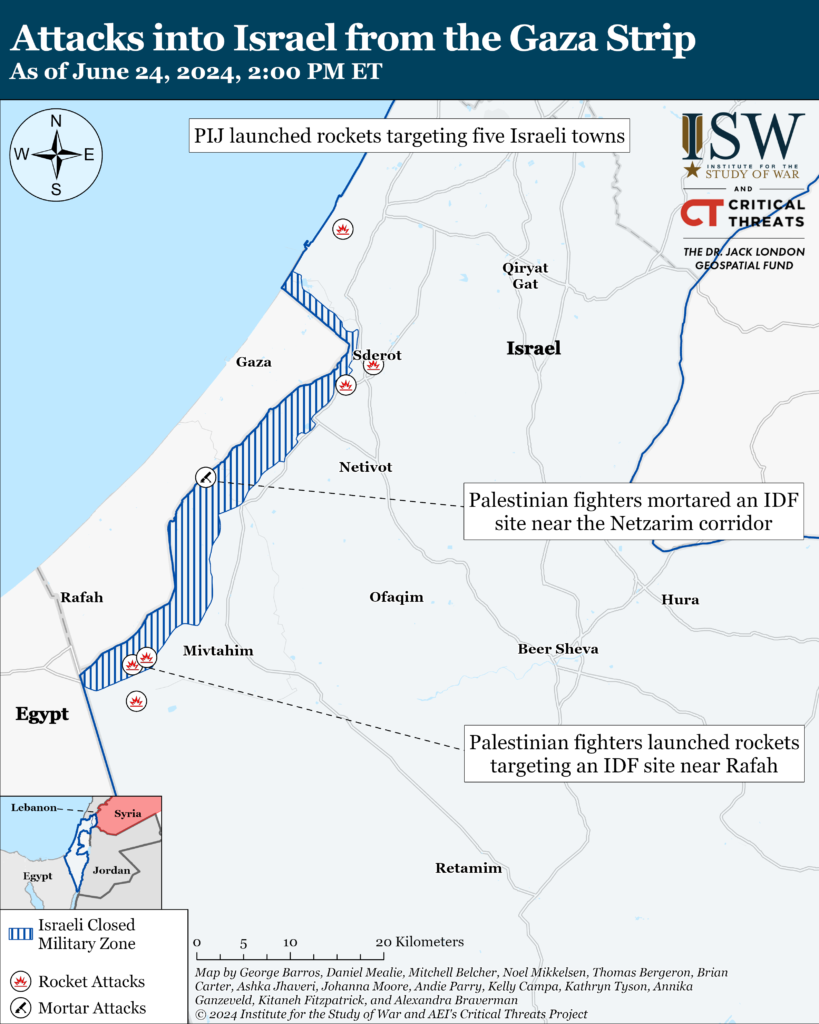
Recorded reports of attacks; CTP-ISW cannot independently verify impact.
West Bank
Axis of Resistance objectives:
Establish the West Bank as a viable front against Israel
PIJ said on June 23 that it detonated improvised explosive devices (IED) in Bat Hefer—an Israeli town west of Tulkarm.[xxxvii] The IDF reported an IED attack near Tulkarm on June 24 but said that the attack occurred hundreds of meters from the Israel-West Bank border wall.[xxxviii] Israeli media reported that two explosions occurred about 60 meters from the border wall.[xxxix] The IDF said that the attack did not cause any damage or casualties but was meant to attract IDF forces to Tulkarm.[xl] The alleged attack follows a recent uptick in Palestinian attacks from Tulkarm into Bat Hefer. Palestinian fighters claimed seven attacks targeting Bat Hefer in April and May 2024, compared to four attacks between October 2023 and March 2024.[xli]
Israeli forces reportedly detained several Palestinian workers trying to cross from Tulkarm into Bat Hefer on June 24.[xlii] Approximately 30 unarmed Palestinians also tried to cross the border wall into Bat Hefer on May 27.[xliii]
Israeli forces have engaged Palestinian fighters in at least six locations in the West Bank since CTP-ISW’s last data cutoff on June 23.[xliv] The al Aqsa Martyrs Brigades fired small arms and detonated IEDs targeting Israeli forces near Tubas.[xlv]
Israeli forces detained 14 wanted individuals and confiscated weapons across the West Bank on June 24.[xlvi]
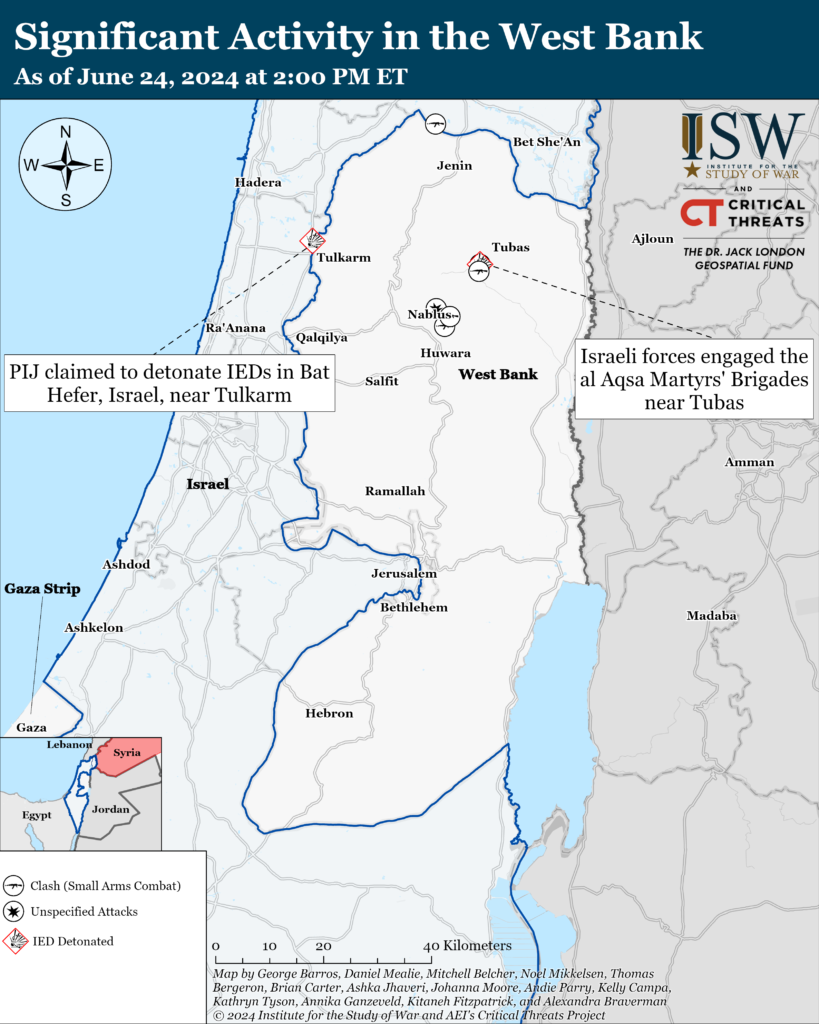
This map is not an exhaustive depiction of clashes and demonstrations in the West Bank.
Southern Lebanon and Golan Heights
Axis of Resistance objectives:
Deter Israel from conducting a ground operation into Lebanon
Prepare for an expanded and protracted conflict with Israel in the near term
Expel the United States from Syria
The Axis of Resistance is signaling that it would expand fighting if Israel launched a major offensive into Lebanon. Iranian-backed Iraqi and Lebanese officials told the Associated Press that thousands of Iranian-backed fighters would join Lebanese Hezbollah if war erupted between Israel and Lebanon.[xlvii] Two Iraqi officials said that some Iraqi advisers are already in Lebanon to support Hezbollah. A Lebanese official said that fighters from Iraq, Afghanistan, Pakistan, and Yemen would come to Lebanon to join the war against Israel.
The statements follow the IDF announcement on June 18 that it approved operational plans for a military offensive into Lebanon.[xlviii] Israeli Prime Minister Benjamin Netanyahu said on June 24 that the IDF will move its forces to northern Israel as the fighting in the southern Gaza Strip winds down, echoing similar statements from other Israeli officials.[xlix]
Iranian-backed Iraqi militia Asaib Ahl al Haq (AAH) separately threatened on June 24 to attack US interests in the Middle East if the United States supports a major Israeli offensive into Lebanon.[l] The leader of AAH, Qais al Khazali, stated that the militia could target and endanger “all [US] interests in the region and Iraq” if the United States supports an Israeli operation. AAH is part of the Islamic Resistance in Iraq, a coalition of Iranian-backed Iraqi militias that conducted over 160 attacks targeting US forces in Iraq, Syria, and Jordan between late October 2023 and late January 2024. The Islamic Resistance in Iraq suspended attacks targeting US forces in late January 2024 following a one-way drone attack that killed three US personnel in northeastern Jordan.
The Islamic Resistance in Iraq suspended attacks targeting US forces in late January 2024 following a drone attack that killed three US personnel in northeastern Jordan.[li]
The Telegraph reported on June 23 that workers at the Beirut-Rafik Hariri International Airport are concerned about an increase in Iranian weapons deliveries to Hezbollah.[lii] The sources have reportedly observed the arrival of “unusually big boxes” and an increased presence of senior Hezbollah commanders in the airport since the Israeli-Hamas war began in October 2023.[liii] The sources added that the Hezbollah weapons cache includes Falaq 1/2 rockets (10-11 km range), Fateh-110 ballistic missiles (250-300 km range), and Burkan short-range ballistic missiles (800-1,000 km range).[liv] Lebanon’s transport minister, who was nominated to the government by Hezbollah, denied on June 23 that Hezbollah was storing weapons at the Beirut airport.[lv]
Hezbollah has conducted at least five attacks into northern Israel since CTP-ISW’s last data cutoff on June 23.[lvi]
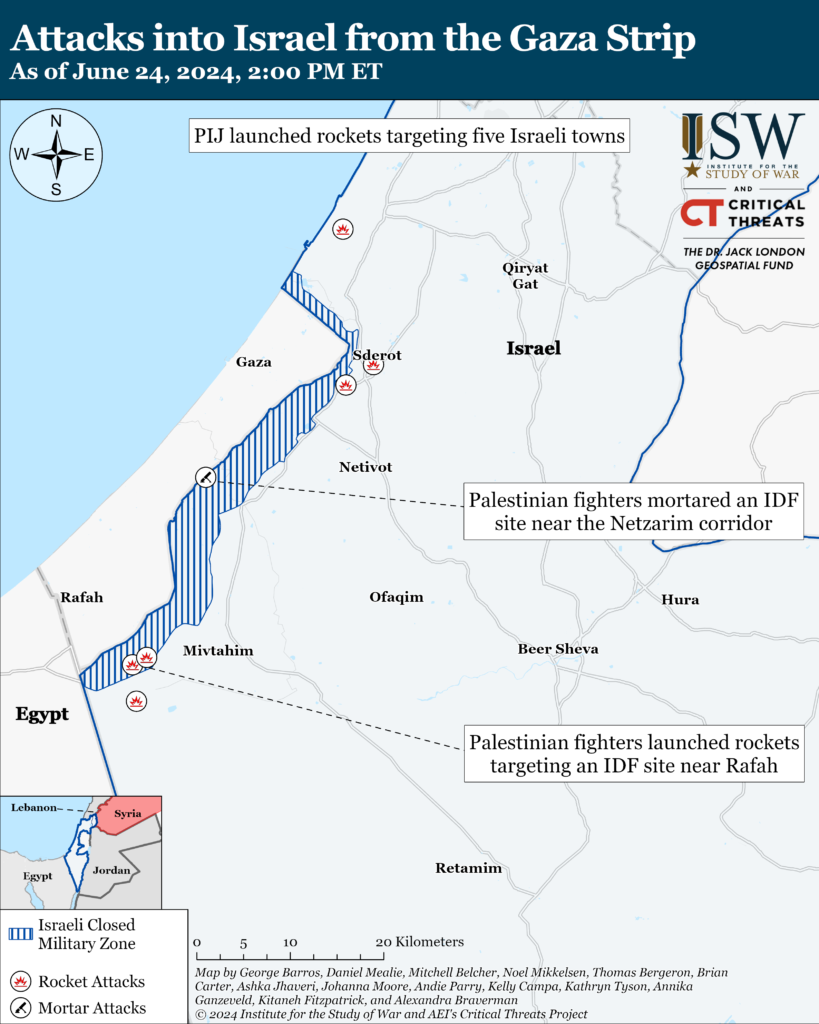
Recorded reports of attacks; CTP-ISW cannot independently verify impact.
Iran and Axis of Resistance
Hamas is planning to relocate its political leadership to Baghdad amid increasing pressure from Western countries and Qatar on Hamas to show greater flexibility in ceasefire negotiations with Israel.[lvii] Unspecified sources speaking to Emirati media claimed that the Iraqi federal government approved in May 2024 a Hamas plan to relocate to Baghdad. The sources said that Iraqi and Iranian government officials, including Iraqi Prime Minister Mohammad Shia al Sudani, had discussed the plan with Hamas Political Bureau Chairman Ismail Haniyeh. The sources also said that Iran will be responsible for protecting Hamas leaders and assets in Iraq. This report follows the opening of a Hamas political office in Baghdad on June 11.[lviii] Members of Iranian-backed Iraqi militia Kataib Imam Ali visited the office on June 11 and met with a member of Hamas’ Office for Arab and Islamic Relations, Mohammad al Hafi.[lix] The unspecified sources told the Emirati outlet that Hamas intends to open a media office in Baghdad in the coming weeks.[lx]
Syrian media reported that the IDF shelled Syrian Arab Army (SAA) outposts in Quneitra Province, Syria, on June 24.[lxi] Syrian media reported that the Israeli shelling caused material damage to buildings in al Baath, Quneitra.[lxii] The IDF dropped leaflets over Quneitra after the strike that warned the SAA against operating in the demilitarized zone between the Israeli-controlled Golan Heights and Syria.[lxiii]
The Houthis launched a likely drone attack that damaged the Liberian-flagged, Greek-owned and -operated bulk cargo carrier M/V Transworld Navigator in the Red Sea on June 23.[lxiv] US CENTCOM reported that the Houthis launched a “suspected” uncrewed aerial system (UAS) targeting the Transworld Navigator.[lxv] The crew reported minor injuries and that the vessel sustained moderate damage.[lxvi] The ship continued to travel to its port of call.[lxvii] Houthi spokesperson Brigadier General Yahya Sarea claimed that the Houthis launched an uncrewed surface vessel (USV) at the Transworld Navigator because the vessel violated the Houthi ban on entry to Israeli ports.[lxviii] CENTCOM reported that this recent attack was the fourth Houthi attack targeting the Transworld Navigator.[lxix]
The Houthi movement claimed on June 23 that it launched cruise missiles targeting the Liberian-flagged Stolt Sequoia in the Indian Ocean.[lxx]
The Houthis likely conducted an attack targeting the Liberian-flagged container ship MSC Sarah V in the Arabian Sea on June 24. UKMTO reported that it received reports on June 24 of an explosion near MSC Sarah V southeast of Nishtun, Yemen.[lxxi] There were no injuries.[lxxii] The Houthis have not claimed the attack at the time of this writing.
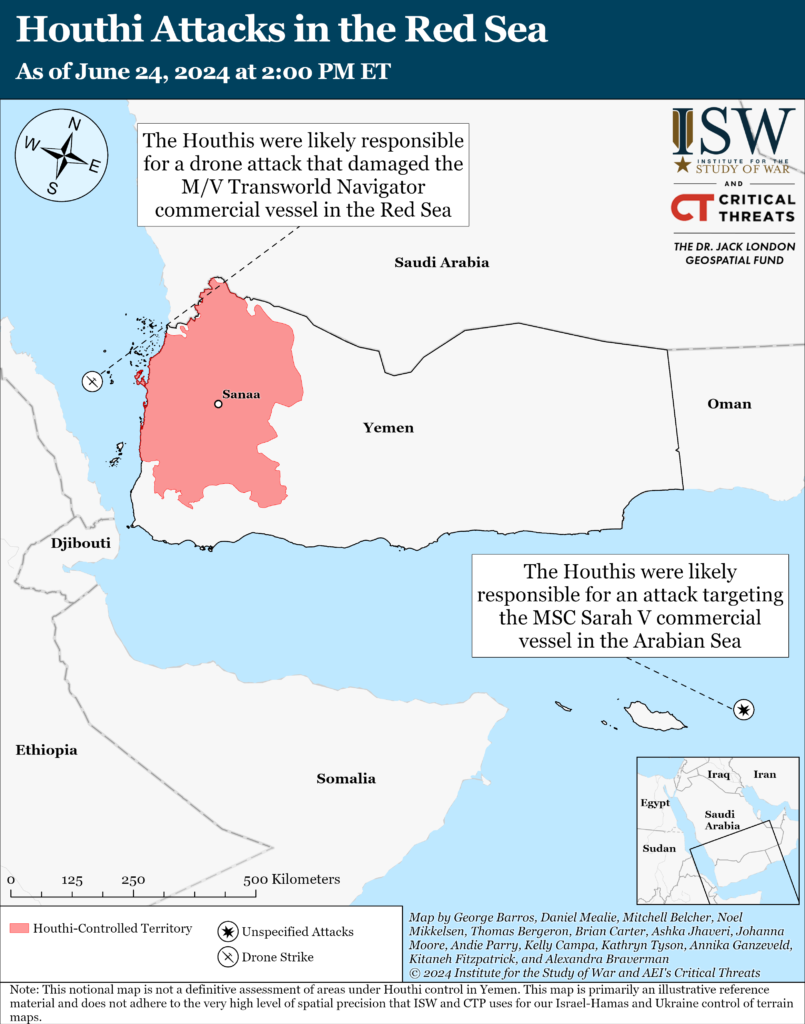
Iranian Supreme Leader Ali Khamenei met with senior judiciary officials on June 22.[lxxiii] Khamenei called the presidential election programming “good” but cautioned candidates to not use “hostile words.” He also warned presidential candidates not to make statements that ”make the enemy happy.” Khamenei is possibly referring to reformist candidate Masoud Pezeshkian, who has condemned the harsh treatment of women during his presidential campaign. [lxxiv]
Iran hosted 40 foreign delegations at the Asian Cooperation Dialogue (ACD) Forum’s 19th Session in Tehran on June 24.[lxxv] Delegations from China, Saudi Arabia, South Korea, Qatar, and Russia were present. Acting Foreign Affairs Minister Ali Bagheri Kani met with delegations on the sidelines of the forum, including with Bahraini Foreign Affairs Minister Abdullatif bin Rashid al-Zayani to discuss a framework for restoring diplomatic relations, which the two states severed in 2016.[lxxvi]
 Eurasia Press & News
Eurasia Press & News
